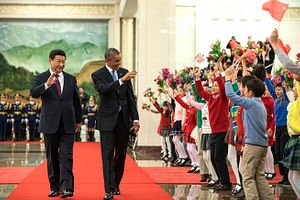China is sending mixed signals about its views of the Trans-Pacific Partnership that the U.S., Japan, and ten other nations are currently negotiating.
As Clint and many others have discussed in recent weeks, the U.S. and China seemed to advance competing regional trade pacts at the Asia-Pacific Economic Cooperation leaders’ summit in Beijing this week. On the one hand, President Barack Obama led a meeting of TPP leaders on the sidelines of the APEC summit, and continued to express optimism that a deal is within reach. At the same time, China successfully pushed APEC leaders to endorse in theory its favored Free Trade Area of the Asia-Pacific (FTAAP).
However, President Xi strongly dismissed the notion that Beijing views these as competing free trade agreements, or that China views the TPP as targeting or trying to contain it. “I don’t see any of the regional free trade agreements as targeting China. China is committed to open regionalism and we believe the various regional cooperation initiatives should positively interact with each other. That is currently the case,” Xi said during his press conference with Obama on Wednesday.
Just a day later, however, China’s state media contradicted Xi in an editorial attributed to the Global Times but which appeared on the website of the People’s Daily, the official newspaper of the Chinese Communist Party. In no uncertain terms, the editorial attacks the Trans-Pacific Partnership as aimed at containing China by perpetuating a U.S. and Japan-led regional order.
“Washington still cherishes the wishful thinking that it is able to hammer out a U.S. and Japan-led free trade system by means of the TPP as the framework, by which they can bend China’s will to their wishes so that it will follow their lead after joining the system.” the editorial opined.
It added that many in the U.S. believe the TPP is essential because “only by reinforcing the U.S.-Japan alliance can a new system to counterbalance China’s rise be brought out.” The article also warned, “The facts have shown that rules which are made without China’s participation will not end up well. Some 30 years ago, the U.S. might be able to make them work, but now, it’s very unlikely to do that.”
Although editorials in China’s state media do not carry anywhere near the same significance that official government statements do, they also do not feature viewpoints that are directly at odds with the CCP line. This is especially true on foreign policy and national security issues, as well as on their English-language websites. Further complicating matters, China has at times suggested it may seek to join the TPP, despite the high standards the agreement is expected to include.
With all these contradicting statements, it’s anyone’s guess what China’s views of the TPP really are.































